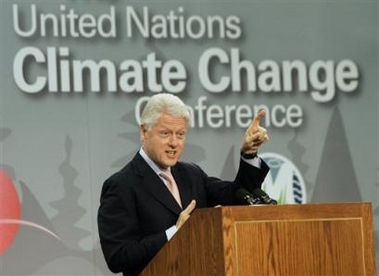|
Clinton: Bush is 'flat wrong' on Kyoto
(AP)
Updated: 2005-12-10 09:32
Delegates from around the world worked into the final hours of a U.N. climate
conference on Friday to produce a plan for deeper cuts after 2012 in
greenhouse-gas emissions, buoyed by a last-minute message of support from former
President Clinton.
Clinton, in an applause-filled appearance at the Montreal meeting, said
President Bush was "flat wrong" to claim that reducing greenhouse-gas emissions
to fight global warming would damage the U.S. economy. But the ex-president
urged the negotiators from more than 180 nations to find a way to "work with"
the current U.S. administration.
Throughout the two-week conference, the Bush administration repeatedly
rejected Canadian and other efforts to draw it into future global talks on
emission controls, just as in 2001 it renounced the existing Kyoto Protocol and
its mandatory cuts.

Former President Bill Clinton speaks to
reporters after addressing the United Nations Climate Change Conference in
Montreal, Friday, Dec.9, 2005. [AP] | Canadian
officials said the U.S. delegation was displeased with the last-minute
scheduling of the Clinton speech. But U.S. delegation chief Paula Dobriansky
issued a statement saying events like Clinton's appearance "are useful
opportunities to hear a wide range of views on global climate change."
Despite Clinton's message, many here seemed resigned to waiting for a
political change in Washington.
"It's such a pity the United States is still very much unwilling to join the
international community, to have a multilateral effort to deal with climate
change," said the leader of the African group of nations here, Kenya's Emily
Ojoo Massawa.
"The administration just doesn't seem to get it. They don't understand the
world is suffering from climate change," said Jennifer Morgan of the
environmentalist group Climate Action Network.
The U.S. delegation had little public comment, maintaining the low profile it
has generally kept at recent annual climate conferences.
This was the first such meeting since the Kyoto Protocol took effect last
February, mandating cutbacks in 35 industrialized nations of emissions of carbon
dioxide and five other gases by 2012.
A broad scientific consensus agrees that these gases accumulating in the
atmosphere, byproducts of automobile engines, power plants and other fossil
fuel-burning industries, contributed significantly to the past century's global
temperature rise of 1 degree Fahrenheit.
Continued warming is melting glaciers worldwide, shrinking the Arctic ice cap
and heating up the oceans, raising sea levels, scientists say. They predict
major climate disruptions in coming decades.
Clinton's vice president, Al Gore, was instrumental in negotiating the treaty
protocol initialed in 1997 in Kyoto, Japan �� a pact that the Senate subsequently
refused to ratify. When Bush, taking office, rejected Kyoto outright, he
complained that China, India and other major industrializing countries were not
bound by its emission controls.
The protocol's language required its member nations at this point to begin
talks on presumably deeper emissions cuts for the next phase, after 2012.
Negotiations among the more than 150 nations that ratified Kyoto went on
until dawn Friday and then resumed later in the day, as they hammered out final
details of a plan whereby a working group would begin developing post-2012
proposals. The tentative document included no deadline for that work, but said
it should be completed early enough to ensure that no gap develops after 2012.
That would guarantee an uninterrupted future for the burgeoning international
"carbon market," in which carbon reductions achieved by one company can be sold
to another to help it meet its target.
At the same time, the host Canadians tried to draw in the Americans, Kyoto
outsiders, on a parallel track, under the nonbinding 1992 U.N. climate treaty.
Canada's proposals offered vague, noncommittal language by which Washington
would join only in a "dialogue" to "explore" cooperative action.
The U.S. negotiators repeatedly rejected these efforts, however, and instead
pointed to $3-billion-a-year U.S. government spending on research and
development of energy-saving technologies as a demonstration of U.S. efforts to
combat climate change.
In a news conference after his speech, Clinton suggested the Europeans and
others not force "targets" on Washington, but look for agreement on specific
energy-saving projects.
"If we just keep working with the administration, we'll find some specific
things we can do that are consistent with the targets," he said, but "without
embracing the targets."
Most of the conference was devoted to the nuts-and-bolts work of the climate
pacts.
Environmentalists were pleased at agreements in such areas as how to quantify
gas emissions and how to penalize nations that do not meet Kyoto targets.
"They've released the brakes on the Kyoto process," said Greenpeace
International's Bill Hare.
Others expressed disappointment, meanwhile, there was not more progress here
in such areas as helping finance developing countries' adaptation to damaging
climate change.
|